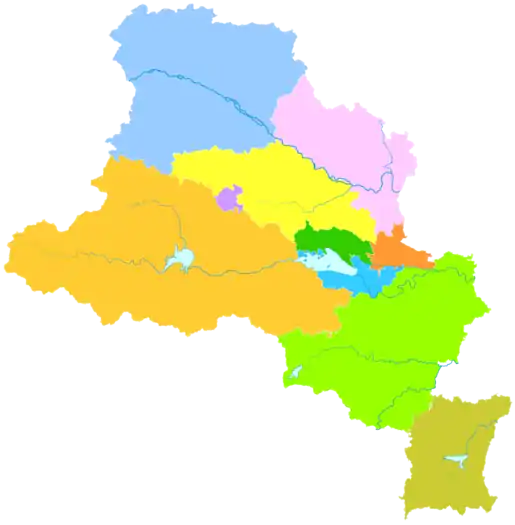Pingdingshan
Pingdingshan (Chinese: 平顶山), also known as the Eagle City (Chinese: 鹰城; pinyin: Yīngchéng), is a prefecture-level city in central Henan province, China. It had 4,904,701 inhabitants at the 2010 census whom 1,756,333 lived in the built-up or metropolitan area including Ye county.[3]
Pingdingshan
平顶山市 Pingtingshan | |
|---|---|
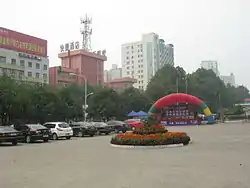 | |
| Nickname(s): Eagle City | |
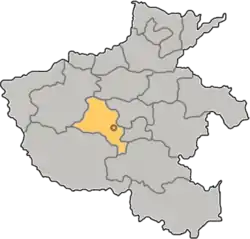 Pingdingshan in Henan | |
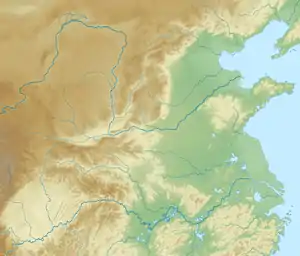 Pingdingshan Location on the North China Plain 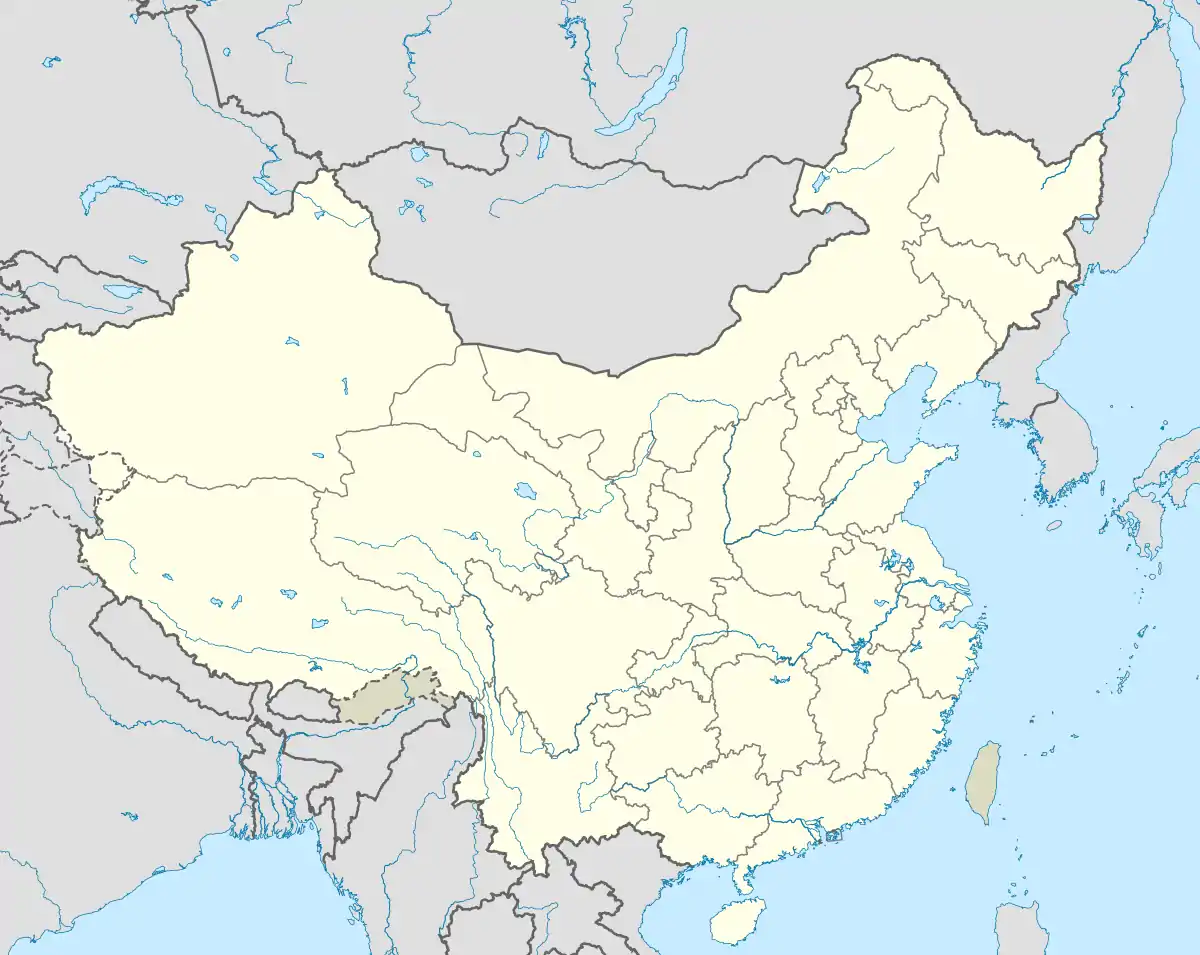 Pingdingshan Pingdingshan (China) | |
| Coordinates (Pingdingshan CPPCC): 33°44′12″N 113°17′47″E | |
| Country | People's Republic of China |
| Province | Henan |
| Municipal seat | Xinhua District |
| Government | |
| • Secretary of Municipal Committee of the CPC | Deng Yongjian |
| Area | |
| • Prefecture-level city | 7,874 km2 (3,040 sq mi) |
| • Urban | 384 km2 (148 sq mi) |
| • Metro | 1,771 km2 (684 sq mi) |
| Population (2019)[2] | |
| • Prefecture-level city | 5,207,700 |
| • Density | 660/km2 (1,700/sq mi) |
| • Urban | 979,130 |
| • Urban density | 2,500/km2 (6,600/sq mi) |
| • Metro | 1,756,333 |
| • Metro density | 990/km2 (2,600/sq mi) |
| Time zone | UTC+8 (China Standard) |
| Postal code | 467000 |
| Area code(s) | 0375 |
| ISO 3166 code | CN-HA-04 |
| GDP | ¥25.345 billion (2014) |
| Major Nationalities | Han, Hui |
| County-level divisions | 10 |
| Township-level divisions | 124 |
| License plate prefixes | 豫D |
| Website | www |
| Pingdingshan | |||||||
|---|---|---|---|---|---|---|---|
| Simplified Chinese | 平顶山 | ||||||
| Traditional Chinese | 平頂山 | ||||||
| |||||||
Geography
Pingdingshan borders the provincial capital of Zhengzhou to the north, Xuchang and Luohe to the east, Zhumadian to the southeast, Nanyang to the south, and Luoyang to the west.
History
Pingdingshan was founded in 1957. In Chinese, Pingdingshan means “mountain with a flat top”. The city is named after a nearby plateau, the top of which is very flat. The reason for the nickname of the city "Eagle City" can be traced back to two thousand years ago during the "Spring and Autumn Annals". There was a small country royal named Ying who lived in Pingdingshan area. In ancient times, the word "Ying" had the same pronunciation as Eagle in Chinese, therefore people also called Pingdingshan "Eagle City".
Mayors
From 2003.08 to 2005.04 Wang Zhaoping was the Mayor of Pingdingshan. From 2005.04 to 2008.03 Zhao Qinglin was the Mayor of Pingdingshan. From 2008.03 to 2010.10 Li Endong was the Mayor of Pingdingshan. From 2010.10 to 2013.04 Chen Jiansheng was the Mayor of Pingdingshan. From 2013.04 to now Zhang Guowei was the Mayor of Pingdingshan.
Administration
The prefecture-level city of Pingdingshan administers 4 districts, 2 county-level cities and 4 counties.
| Administrative divisions | Chinese | Area (km2) | Population | Post code |
|---|---|---|---|---|
| Xinhua District | 新华区 | 157 km2 or 61 sq mi | 389,866 | 467002 |
| Weidong District | 卫东区 | 103 km2 or 40 sq mi | 302,603 | 467021 |
| Zhanhe District | 湛河区 | 124 km2 or 48 sq mi | 286,661 | 467000 |
| Shilong District | 石龙区 | 35 km2 or 14 sq mi | 54,912 | 467045 |
| Ruzhou City | 汝州市 | 1,573 km2 or 607 sq mi | 927,934 | 467500 |
| Wugang City | 舞钢市 | 640 km2 or 250 sq mi | 313,828 | 462500 |
| Lushan County | 鲁山县 | 2,406 km2 or 929 sq mi | 789,901 | 467002 |
| Baofeng County | 宝丰县 | 722 km2 or 279 sq mi | 490,269 | 467400 |
| Ye County | 叶县 | 1,387 km2 or 536 sq mi | 777,203 | 467200 |
| Jia County | 郏县 | 727 km2 or 281 sq mi | 571,524 | 467100 |
| Map |
|---|
Colleges and universities
- Pingdingshan University
- Pingdingshan Institute of Technology[4]
High schools
- Pingdingshan No.1 Middle School
- Pingdingshan No.1 High School
- Pingdingshan No.2 Middle School
- Pingdingshan No.2 High School
- Pingdingshan No.3 High School
- Pingdingshan No.8 Middle School
- Pingdingshan Experimental High School
- Lushan No. 1 Middle School
Resources
- Mineral Resources: Pingdingshan has extensive mineral resources such as coal, manganese, salt, iron, aluminum, fluorite, gypsum, etc.
- 10.3 billion tons of coal reserves, the largest coalfield area in the South and East of China; well known as "the coal storage of the central area of China".
- 230 billion tons of salt reserves, ranking first in Henan Province, second in China.
- Henan province houses some of the biggest limestone reserves in China estimated over 24 billion tons, Pindingshan is the cement center for limestone mine production and quarrying in the province.[5]
- Pingdingshan is very rich in water resources compared to other inland cities. It has Baiguishan Reservoir, Zhaopingtai Reservoir, Yanshan Reservoir, Shimantan Reservoir and Gushitan Reservoir.
Twin towns — sister cities
Pingdingshan, People's Republic of China is twinned with:
 Syzran, Samara Oblast, Russia (11/28/2000)[6]
Syzran, Samara Oblast, Russia (11/28/2000)[6]
Economy
Pingdingshan has been identified by the Economist Intelligence Unit in the November 2010 Access China White Paper as a member of the CHAMPS (Chongqing, Hefei, Anshan, Maanshan, Pingdingshan and Shenyang), an economic profile of the top 20 emerging cities in China.[7]
Tourism
- Pingdingshan thrush Valley A National "AAA" rated scenic spot and a major tourist attraction in Henan. It is named after the many thrushes breeding here. The scenic area is a total of 30 square kilometres (12 sq mi). There are numerous attractions such as cuckoo lake, an area known as "the pocket of the Three Gorges".
- Yaoshan A national "AAAA" rated scenic spot. Located nearby in Lushan County. Originally known as Yaoshan Shirenshan. Home to the Spring Temple Buddha, the second largest statue in the world, built in 2002.
See also
References
- 最新人口信息 www.hongheiku.com (in Chinese). hongheiku. Retrieved 2021-01-12.
- 最新人口信息 www.hongheiku.com (in Chinese). hongheiku. Retrieved 2021-01-12.
- "China: Administrative Division of Hénán / 河南省". Retrieved 28 May 2015.
- 河南城建学院. Retrieved 28 May 2015.
- "China Mineral Resources 2018" (PDF).
- "Sister city relationship Syzran" (in Russian). Archived from the original on 2010-09-25.
- Grayling. "THE RISE OF THE 'CHAMPS' - NEW REPORT MAPS BUSINESS OPPORTUNITY IN CHINA'S FASTEST GROWING CITIES". SourceWire. Retrieved 28 May 2015.
External links
| Wikivoyage has a travel guide for Pingdingshan. |
